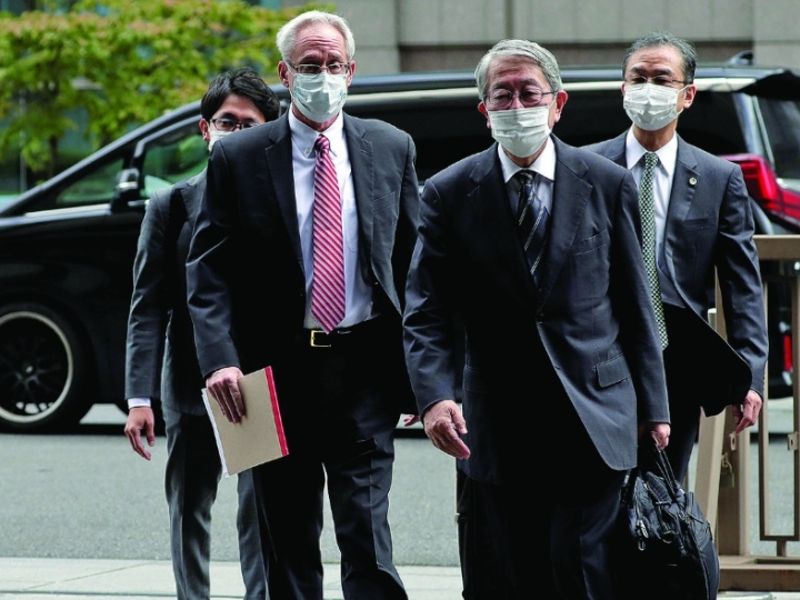
TOKYO — Carlos Ghosn was afraid of being fired as CEO of Renault if the world knew how much salary he was really making, according to testimony in the Japanese trial against one of his former deputies, American human resources executive Greg Kelly.
A key witness this month turned up the heat on Kelly, who stands accused of attempting to conceal Ghosn’s compensation package from financial documents.
A small army of top executives were preoccupied with finding ways to pay Ghosn more money in secret, according to Hari Nada, a current Nissan legal executive who agreed to testify in the case in exchange for immunity from being prosecuted.
According to Nada, some executives referred to the problem of Ghosn’s deferred, unreported income as his “haircut.”
Prosecutors allege that Ghosn and Kelly conspired to hide more than $80 million in deferred payment — money that would somehow need to be paid to Ghosn after his retirement.
Nada, who ran legal affairs and the CEO office at Nissan and helped plan Ghosn’s allegedly postponed payout, this month claimed that Kelly was in charge of paying off the “haircut.”
Nada claimed that the American wished to retire but could not do so until Ghosn’s payments were figured out.
Kelly, now 64, oversaw Nissan’s legal affairs, human resources and its CEO office. In 2014, he handed off the legal affairs and CEO office duties to Nada. Kelly then retired from operational duties at Nissan in 2015, but stayed on for one more year in an executive position leading human resources for the Renault-Nissan alliance.
After that, Kelly was eager to retire for good but the Ghosn haircut was still not resolved, Nada asserted. The trusted American executive was kept on the Japanese carmaker’s board as a representative director, with the power to sign legal documents, largely to manage Ghosn’s compensation, Nada said.
While pointing the finger at Kelly, Nada also painted a picture of an executive who was simply ready to exit. Nada said Kelly’s continued role was largely about Ghosn’s compensation issues.
“He said simply, it was to get Ghosn paid — and once he’s paid, I can go fishing,” Nada recounted Kelly as explaining. “Mr. Kelly considered it his duty to get Mr. Ghosn’s haircut paid.”
Nada said Ghosn wanted the payout without having to report it in Nissan’s financial filings so as not to spark criticism in France, where Ghosn was paid less by Renault and where the public frowns on exorbitant executive pay. The French government, as Renault’s biggest shareholder, kept a tight lid on remuneration there.
“He didn’t want to be fired,” Nada said of Ghosn. “If he paid himself what he wanted, and that was disclosed, the French state would have felt obliged to fire him.”
Nada said Nissan executives were rushing to arrange Ghosn’s deferred payment package because Ghosn was expected to retire from Nissan around 2015 or 2016. But Ghosn continued to lead both companies, and also eventually Mitsubishi Motors Corp., until his November 2018 arrest in Tokyo.
Kelly and Ghosn were arrested the same day after landing in Japan on separate flights. Both deny the criminal charges. But Ghosn, 66, fled Japan in December 2019 to seek refuge in Beirut, beyond the reach of Japanese law. That left Kelly to stand trial alone, facing years in Japanese prison if found guilty.
The trial began in September, but Nada’s testimony was the first to zero in on Kelly’s alleged role as a key figure. Testimony by other witnesses portrayed Kelly as a tangential player, one of many trying to retain Ghosn’s talent.
Nada testified he took orders from Kelly and worked closely with Kelly to examine different payment ideas. One proposal included buying Ghosn’s image and publishing rights, thereby compensating him for any future books or intellectual property projects.
But they settled on a basic three-legged framework that included increasing Ghosn’s pension payout, paying him for a noncompete contract and agreeing to an advisory fee. All this, Nada alleged, was meant to compensate Ghosn for not taking the full amount of earnings earlier.
Kelly’s defense, by contrast, maintains that Kelly was not directly involved with many of the remuneration discussions. Moreover, the ones Kelly pursued were framed as incentives to compensate Ghosn for future services to the company, post-retirement, not work already rendered. The goal, the defense says, was to retain Ghosn’s talent after he retired so he wouldn’t defect to a competitor.
Another legal wild card is whether Ghosn’s pay package was actually finalized.
Kelly’s defense rests partly on the argument that the payouts were never decided. Thus, his lawyers contend, any agreements were not legally enforceable and there was no obligation to disclose them.
Kelly’s attorneys will get a chance to cross-examine Nada as early as this week.
Before Nada’s testimony, the court also heard this month from Toshiyuki Shiga, a former COO and vice chairman under Ghosn, and Itaru Koeda, Nissan’s co-chairman from 2003 to 2008.
Both said they were also involved in helping plan Ghosn’s alleged payouts.
“To summarize, there was a failure of corporate governance at Nissan,” Shiga said. “Carlos Ghosn gradually changed, and he wouldn’t listen to other people. He became almost like a dictator. But those who allowed that to happen share in the responsibility.”
Both Shiga and Koeda asserted that they thought the creative accounting was illegal, even as they worked on it. But they said they were powerless to oppose the moves to Ghosn.
“He had absolute power over all issues, especially executive remuneration,” Koeda said.
Ghosn has said in the past that the criminal charges against him were concocted by a cabal of Nissan hard-liners and Japanese government officials who wanted to block his plan to merge Renault and Nissan under a holding company. Nissan leadership was consistently against such a merger.